Rabbits are known for their love of fresh greens, and many pet owners wonder, “Can rabbits eat kale?” Kale, a popular leafy green, is celebrated for its nutritional value among humans, but does it offer the same benefits to rabbits?
This article explores the benefits and risks of feeding kale to rabbits, provides guidelines on how much to feed, and examines whether kale can be a regular part of their diet.
By understanding the role of kale in a rabbit’s nutrition, owners can make informed decisions to keep their furry friends healthy and happy.
Can Rabbits Eat Kale?
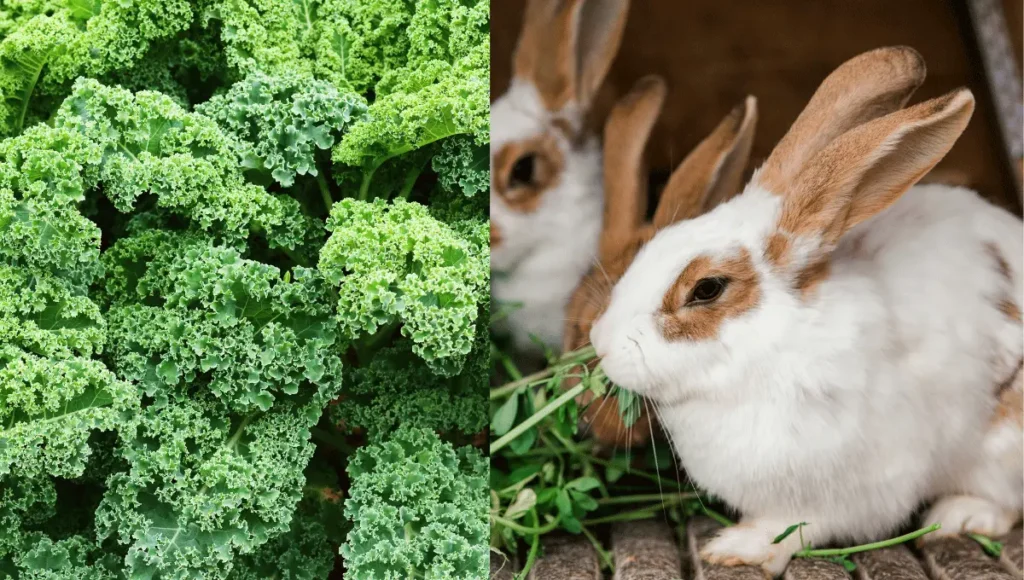
Yes, rabbits can eat kale, but it should be fed in moderation. Kale is a nutrient-rich vegetable belonging to the cabbage family, known for its high vitamin and mineral content.
While it can be a healthy addition to a rabbit’s diet, there are some considerations to keep in mind.
Nutritional Profile of Kale
Kale is packed with essential nutrients, including vitamins A, C, and K, calcium, and fiber. These nutrients are crucial for a rabbit’s overall health, supporting their immune system, bone strength, and digestive health.
However, kale also contains oxalates and calcium, which, if consumed in large quantities, can contribute to the formation of kidney stones and other health issues in rabbits.
Due to its nutrient-dense nature, kale can offer health benefits when included as part of a balanced diet.
However, it is important to understand the right way to introduce kale to a rabbit’s diet and to monitor their health for any adverse reactions.
How Much Kale Can Rabbits Eat?
Moderation is key when feeding kale to rabbits. While kale can provide several health benefits, it’s important not to overdo it.
Recommended Serving Size
Rabbits should be fed a small portion of kale, around one or two leaves, a few times a week. This amount is sufficient to provide the nutritional benefits without the risk of overconsumption. It’s also important to mix kale with other leafy greens to ensure a balanced intake of nutrients. A good rule of thumb is to offer a variety of three to four types of vegetables each day, with kale being just one of those options.
Factors to Consider
When determining how much kale to feed, consider the age, size, and health of the rabbit. Younger rabbits or those with existing health conditions may require a different dietary approach. Additionally, always ensure that the rabbit’s primary diet consists of high-quality hay and pellets, with vegetables being a supplementary treat.
How to Feed Kale to Your Rabbit?
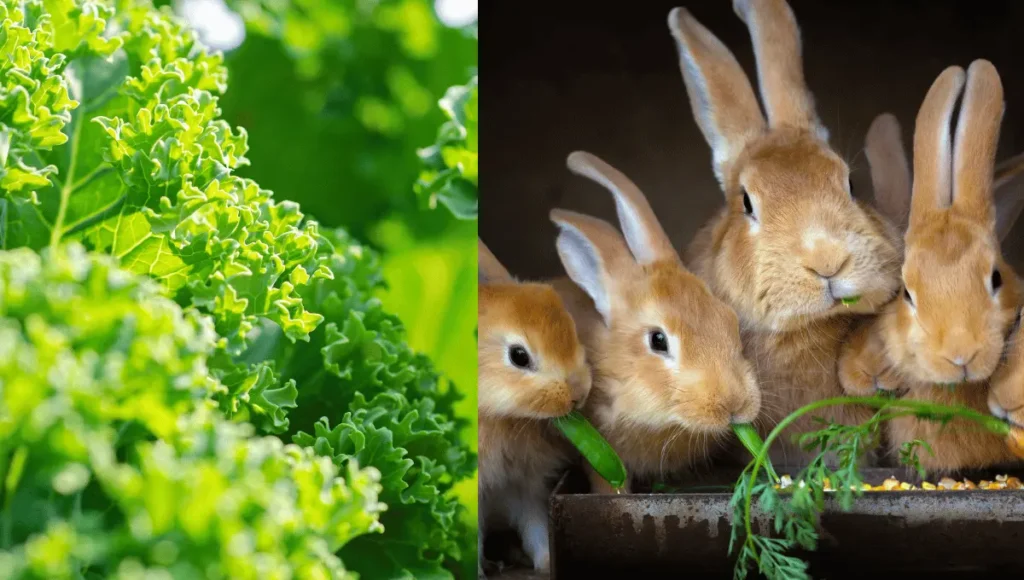
Kale should be introduced to a rabbit’s diet carefully to avoid any digestive upset.
Preparing Kale for Your Rabbit
Before feeding kale to a rabbit, it should be thoroughly washed to remove any pesticides or contaminants. Chop the kale into manageable pieces to make it easier for the rabbit to eat. Some rabbits prefer kale mixed with other vegetables, which can help them adjust to the new food.
Introducing Kale to Your Rabbit’s Diet
Start by offering a small piece of kale and observe the rabbit’s reaction. If they show interest and consume it without any digestive issues, you can gradually increase the amount. However, if the rabbit shows signs of gas, diarrhea, or other digestive problems, it’s best to reduce or eliminate kale from their diet and consult a veterinarian.
Benefits of Kale for Rabbits
Kale offers several health benefits when included in a rabbit’s diet in moderation.
Health Benefits
- Rich in Vitamins: Kale is high in vitamins A, C, and K, which are essential for maintaining a healthy immune system, vision, and blood clotting in rabbits.
- High in Fiber: The fiber content in kale aids in digestion, promoting a healthy gut, and preventing gastrointestinal stasis, a common issue in rabbits.
- Antioxidant Properties: Kale contains antioxidants that can help protect a rabbit’s cells from damage caused by free radicals.
By providing these benefits, kale can contribute positively to a rabbit’s overall health, but only when given in appropriate amounts.
Nutrition Value Of Kale For Rabbits
| Nutrient | Amount per 100g | Benefits for Rabbits |
| Water | 89.6 g | Helps keep rabbits hydrated. |
| Energy | 35 kcal | Provides low-calorie energy. |
| Protein | 2.9 g | Essential for growth, muscle development, and repair. |
| Fat | 0.4 g | Minimal fat, suitable for a low-fat diet. |
| Carbohydrates | 4.4 g | Source of energy. |
| Fiber | 4.1 g | Aids in digestion and maintains healthy gut flora. |
| Calcium | 150 mg | Supports healthy bones and teeth; excess can cause issues. |
| Phosphorus | 29 mg | Works with calcium for bone health; excess phosphorus can be harmful. |
| Vitamin A | 6812 IU | Essential for vision and immune system support. |
| Vitamin C | 93.4 mg | Important for overall health and immune system; rabbits synthesize their own. |
| Vitamin K | 389.6 µg | Supports blood clotting and bone metabolism. |
| Potassium | 447 mg | Important for muscle function and maintaining fluid balance. |
| Iron | 1.5 mg | Crucial for oxygen transport in the blood. |
| Magnesium | 33 mg | Supports muscle and nerve function, as well as bone health. |
| Folate (Vitamin B9) | 62 µg | Important for cell growth and metabolism. |
Can Rabbits Eat Kale Everyday?
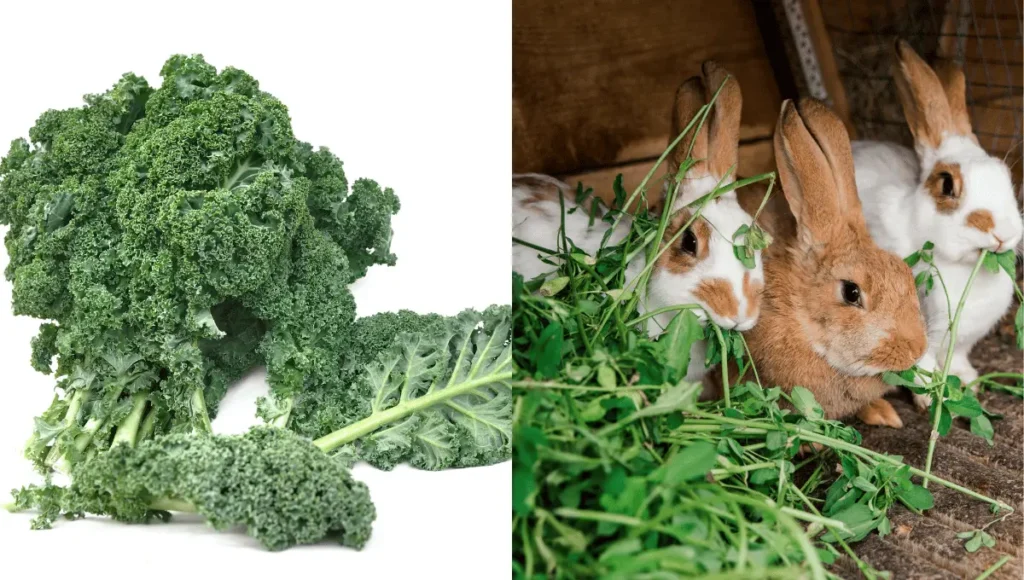
Feeding kale every day is not recommended for rabbits due to its high calcium content.
Potential Risks of Overfeeding
Overfeeding kale can lead to health problems such as:
- Excessive Calcium Intake: High calcium levels can cause urinary stones and other bladder problems.
- Digestive Issues: Too much kale can lead to gas, bloating, and diarrhea due to its high fiber and sulfur content.
To avoid these risks, kale should be fed as a part of a varied diet, not as a daily staple.
What Parts of Kale Do Rabbits Eat?
Rabbits can eat different parts of the kale plant, but not all are equally beneficial.
Can Rabbits Eat Kale Stems?
Kale stems are fibrous and tougher than the leaves. While rabbits can eat the stems, they are harder to digest and may pose a choking hazard. It is advisable to chop them into smaller pieces or avoid feeding the stems altogether, especially to younger rabbits or those with dental issues.
Can Rabbits Eat Kale Sprouts?
Kale sprouts are young kale plants that are softer and easier to digest than mature leaves. They can be a good addition to a rabbit’s diet, but like mature kale, they should be fed in moderation to prevent any digestive issues.
Can Rabbits Eat Kale Leaves?
Kale leaves are the most commonly fed part of the plant. They are softer and easier for rabbits to chew and digest. Make sure to choose fresh, green leaves and avoid any that are yellowing or wilted.
Alternative Feeds to Kale for Rabbits
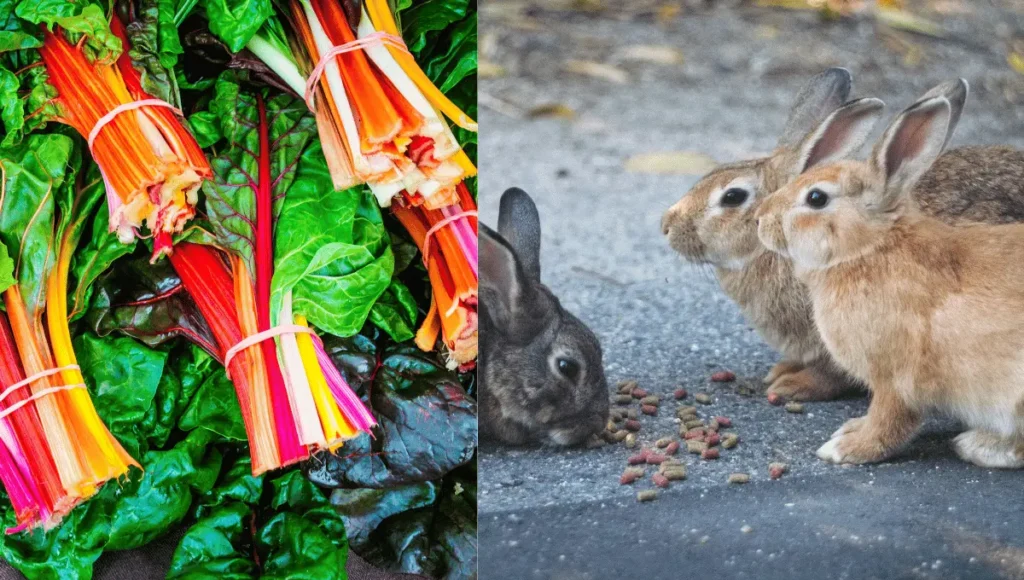
A varied diet is essential for a rabbit’s health, and there are many alternatives to kale that can be included.
Other Leafy Greens for Rabbits
- Romaine Lettuce: A low-calcium option that is rich in water and fiber.
- Spinach: High in vitamins but should be fed in moderation due to oxalate content.
- Bok Choy: Offers a variety of vitamins and minerals while being low in calories.
Balanced Diet Considerations
Rabbits thrive on a balanced diet consisting of:
- High-Quality Hay: The foundation of a rabbit’s diet.
- Fresh Vegetables: A mix of leafy greens and other vegetables for variety.
- Pellets: A nutrient-dense food to supplement hay and vegetables.
Safe Leafy Greens for Rabbits
| Leafy Green | Nutritional Benefits | Feeding Frequency |
| Romaine Lettuce | Low in calcium, high in water and fiber | Daily |
| Spinach | Rich in iron and vitamins A, C, and K | 1-2 times per week |
| Cilantro | High in vitamins and antioxidants | Daily |
| Kale | High in vitamins A, C, and K, rich in fiber | 2-3 times per week |
| Bok Choy | Low calorie, high in vitamin C | 2-3 times per week |
Conclusion
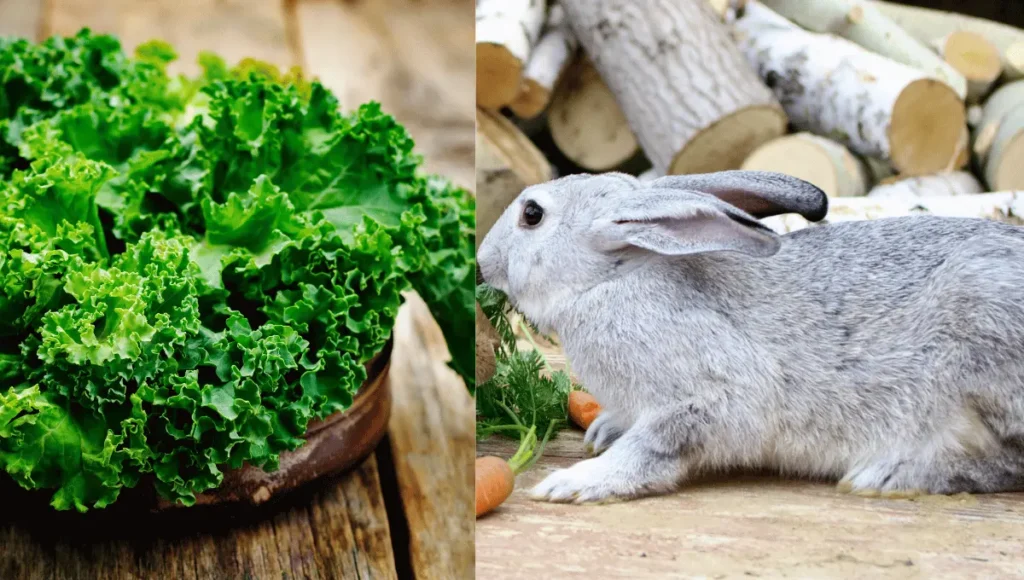
In conclusion, the answer to “Can rabbits eat kale?” is yes, but in moderation. Kale can be a nutritious addition to a rabbit’s diet, providing essential vitamins and fiber.
However, due to its high calcium content and potential for digestive issues, it should not be fed daily. A balanced diet that includes a variety of vegetables, high-quality hay, and pellets is crucial for maintaining a rabbit’s health and well-being.
Always monitor your rabbit’s reaction to new foods and consult with a veterinarian for personalized dietary advice.
FAQs
Can rabbits eat kale every day?
No, rabbits should not eat kale every day. While kale is nutritious, its high calcium content can lead to health issues like urinary stones if consumed daily. It’s best to feed kale in moderation, around 2-3 times a week, as part of a varied diet.
Is kale safe for all rabbits?
Kale is generally safe for most rabbits, but it should be introduced slowly to observe any adverse reactions. Rabbits with certain health conditions, such as kidney problems, may need to avoid kale due to its calcium content. Always consult a veterinarian before introducing new foods.
Can baby rabbits eat kale?
It is not recommended to feed kale to baby rabbits (under 12 weeks old) as their digestive systems are still developing. Instead, focus on a diet primarily of hay and specially formulated pellets until they are older.
How should kale be prepared for rabbits?
Kale should be thoroughly washed to remove pesticides and dirt. It can be chopped into small, manageable pieces to make it easier for rabbits to eat. Mixing kale with other leafy greens can also help balance the diet.
What should I do if my rabbit has digestive problems after eating kale?
If your rabbit shows signs of digestive upset, such as diarrhea or gas, after eating kale, stop feeding it immediately and consult a veterinarian. Reduce the amount or remove kale from the diet and consider other safe leafy greens instead.
